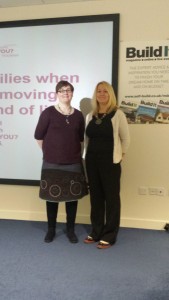
Michelle Smith and her business partner Tina Churchill are both registered nurses with a wealth of experience in palliative care. They set up their business, Who Supports You, earlier this year. A unique and much needed concept, the business runs workshops nationwide for businesses, schools and other organisations to help them create a supportive framework when cancer, other serious illnesses or bereavement impact life. Michelle explains how her and Tina’s work as ‘end of life’ nurses gave them an overview of how patients and their families don’t always get the support they require from employers, and how companies don’t necessarily have the correct approach to dealing with bereaved employees or customers:
“In our nursing work, we noticed people weren’t being given the right time off, or employers weren’t saying the right thing to employees who were ill or caring for an ill relative – they were just dealing with the situation incorrectly. Who Supports You also helps companies deal with recently bereaved customers, for example when they come to close down accounts of the deceased.”
Now, Michelle and Tina go into companies and give training to line managers on how to have those difficult conversations with employees who are either terminally or caring for someone who is terminally ill. Everyone is impacted by illness and death at some point in their lives, so the Who Supports You concept has wide scope for success. However, the pair found making the right connections and reaching new clients challenging initially:
“While everyone was telling us what an amazing idea is was, so many companies have a ‘no name’ policy that we couldn’t get past that first barrier to engage with HR or Occupational Health teams."
Michelle came along to Meet a Mentor in Bristol hoping to meet someone who could help to make those first one-to-one connections and offer guidance on marketing more broadly.
“I wanted to meet someone who could help me to market Who Supports You properly. We were sending random emails in the hope they would get to the right people. We would do a physical mail drop and a lot of social media and although we were getting a lot of ‘likes’ they weren’t becoming actual work.”
On the day, Michelle says, she arrived with no preconception about how the event would unfold.
“The first three or four people I spoke to were interested and gave some useful hints and tips. There was a woman called Maureen who I had specifically noticed beforehand as someone I’d like to meet but I hadn’t got to speak to her. Then, when the session finished I ended up on the same table as her and the whole connection felt very different to the other interactions I’d had.”
As often happens at Meet a Mentor events, Michelle had clicked with Maureen, who once worked as Director of Customer Experience & Quality for a large corporation and is now retired. The two quickly decided to establish a mentor/mentee relationship. Michelle recalls:
“Maureen understood our business idea in the first 60 seconds. She was animated, excited and she said it was right up her street. Out of the whole room, everyone I had spoken to, she just got it straight away.”
Already the pair have exchanged multiple emails, conducted a phone meeting and have a face-to-face meeting scheduled imminently. Asked whether there are particular business areas she’d like to focus on with Maureen aside from marketing and engaging, Michelle responds:
“Yes, I think Maureen will be able to support us with business growth because although we’ve got a five-year plan, it’s just really a vision. We’d like to be able to take our service across the UK. There’d be a network of facilitators out there with Tina and me coordinating it. Having Maureen on board with all her experience we’ll be able to look at how we do that.”
For Michelle and Tina, having a mentor like Maureen could be the catalyst to capitalising on a massive opportunity not only to grow their business successfully but to make the most difficult times in people’s lives marginally less painful:
“There are three million people out there who are working while caring for someone. It’s not only the people who are going to get the diagnosis. It’s the people who are going to work 9-5 and care for someone 24 hours around that. This effects so many people in different way – cancer, dementia, Parkinson’s, heart failure – there are so many illnesses and employers need to have those conversations. If we can get it right, we can make families’ experiences as positive as possible.”


